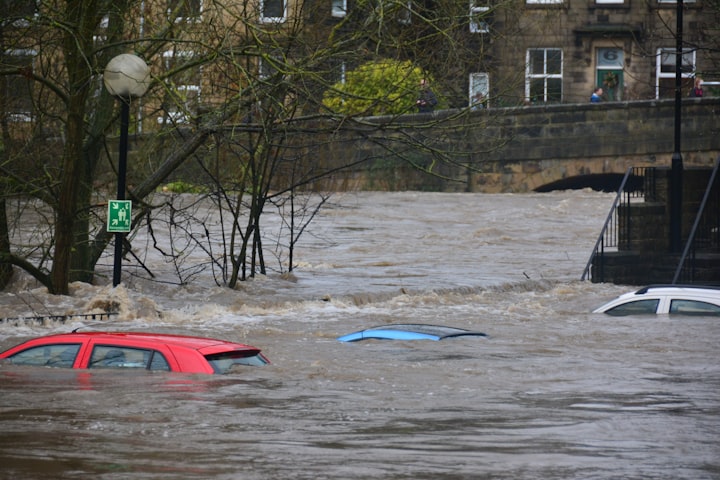After deadly floods, can Germany adapt to its climate future?
After deadly floods, can Germany adapt to its climate future?

Extreme levels of flood danger were announced this morning in Germany. The speed and intensity of floods in Germany, especially in cities near small harbors, shocked many people last week. Rain has set new records for the Rhine River Basin in Germany, where most of the floods occurred. After severe flooding in recent decades, protected areas along major German rivers such as the Rhine or Elbe have been fortified, but heavy rains in recent weeks have turned small rivers such as the Ahr or Swist into larger rivers.
Climate change makes it easier for torrential rains and floods, such as those that caused deadly damage in Western Europe last month, a new scientific study suggests. In Europe, climate change is likely to increase the number of severe, slow-moving storms that can last and cause similar floods in Germany and Belgium. Research literature. A study published last June showed that by 2100, the rate at which global storm speeds could rise by 14 percent, leading to more rainfall and "increased rainfall compared to previous forecasts," the authors wrote. catastrophic floods in Europe. ”That risk could increase if climate change slows down the speed of jet streams - the highest winds around the northern hemisphere - that live in flood-prone areas over a long period due to heavy rainfall, a new study suggests.
Some rivers in Europe are already experiencing climate change, says Fred Hattermann, a water expert and flood specialist at the Potsdam Institute for Climate Impact Research. Although attribution studies have shown that global warming occurs in extreme conditions, there is also significant climate change associated with climate change, said Stefan Rahmstorf, head of global planning at the Potsdam Institute for Climate Impact Research, who was not involved. in a new study. Although new scientific studies have not yet been reviewed by their peers, the authors are using acceptable methods to conduct rapid assessments of specific weather events such as floods, droughts, and heatwaves. The study analyzed historical data and used weather models to determine if global warming caused floods 1.2-9 times and thunderstorms at 3-19% of the region.
The average human impact of flooding is below 1.5 ° C, compared with global warming of 2 ° C, although the expected changes carry the risks of regional variability (moderate self-esteem). Depending on the socio-economic conditions of the future, limiting global warming to between 1.5 ° C and 2 ° C could reduce part of the world of people exposed to climate change caused by climate change by up to 50%, despite significant regional differences. difference (moderate confidence). With global warming at 1.5 ° C above pre-industrial levels, a few regional climate changes are estimated, including extreme temperatures in many areas (high confidence), as well as increased frequency, intensity, and/or heavy rainfall in various areas. . (high confidence) and growing drought or increase in other regions (moderate confidence). Impacts associated with rising sea levels and changes in sea salt, floods, and infrastructure damage are expected to be critical in vulnerable areas such as small islands, coastal plains, and deltas at 1.5 degrees of global warming. degrees Celsius and 2 degrees Celsius (high confidence).
According to the IPCC, the worst health impacts of climate change will include extreme heat and fires leading to increased risk of injury, illness, and death; increased risk of malnutrition due to reduced food production in poor areas; Increased risk of spreading disease. Climate change in Germany is causing a long-term impact on German agriculture, extreme heat and cold waves, light and floods on the coast, and declining water resources. As a highly developed industrial and urban economy with a short coastline compared to other major economies, the impact of climate change in Germany is far more direct than in other major economies.
Meteorologists have long predicted that anthropogenic emissions could cause catastrophic floods, heatwaves, droughts, hurricanes, and other forms of extreme weather events, but recent peaks have exceeded expectations. In the aftermath of a deadly heatwave in the United States and Canada, when temperatures rose above 49.6 ° C in the past two weeks, floods in central Europe have sparked fears that man-made climate change is making matters worse. The World Weather Attribution Initiative, which investigates the link between extreme weather and climate change, will assess the potential for flooding due to its anthropogenic effects.
The qualitative study shows that with global warming, there is a high probability that floods and other catastrophic events will occur more frequently - sooner than before. In areas where flooding is likely to be caused by a few other possible causes, the remaining impact of climate change risk is minimal and it is not possible to make a general, general statement about flood risk change (52). The research will be needed to determine whether floods in recent weeks have occurred without climate change.
Other dangers of climate-related flooding are increasing, including the floods in the Andes and the Himalayas as icebergs melt; floods and mudslides in western North American fire; and destructive coastal rivers due to melting glaciers in Greenland. Significant flood losses are expected in Western European countries (Belgium, Denmark, France, Germany, Ireland, Luxembourg, the Netherlands, and the UK), as well as Hungary.





Comments
There are no comments for this story
Be the first to respond and start the conversation.